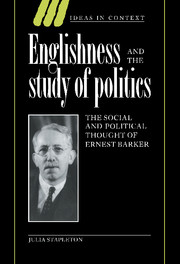Book contents
- Frontmatter
- Contents
- Acknowledgements
- Introduction: The ‘national character’ of Barker's thought
- 1 Lancashire, Idealism, and Whiggism: the making of an English political scientist
- 2 The polis, law, and the development of political studies at Oxford, 1900–1920
- 3 Society and the state in the English national past: the lure of Pluralism
- 4 Statehood, nationhood, and internationalism: English political theory and the First World War
- 5 Education and national character: the milieu of King's College London
- 6 ‘Continental’ political science and the Cambridge Chair
- 7 Traditions of civility: the construction of Englishness in the Second World War and beyond
- 8 The expansion of Englishness: the Books Commission, Europe, and the Commonwealth
- Conclusion: A late-Victorian liberal-conservative
- Select Bibliography
- Index
- Ideas in Context
2 - The polis, law, and the development of political studies at Oxford, 1900–1920
Published online by Cambridge University Press: 11 September 2009
- Frontmatter
- Contents
- Acknowledgements
- Introduction: The ‘national character’ of Barker's thought
- 1 Lancashire, Idealism, and Whiggism: the making of an English political scientist
- 2 The polis, law, and the development of political studies at Oxford, 1900–1920
- 3 Society and the state in the English national past: the lure of Pluralism
- 4 Statehood, nationhood, and internationalism: English political theory and the First World War
- 5 Education and national character: the milieu of King's College London
- 6 ‘Continental’ political science and the Cambridge Chair
- 7 Traditions of civility: the construction of Englishness in the Second World War and beyond
- 8 The expansion of Englishness: the Books Commission, Europe, and the Commonwealth
- Conclusion: A late-Victorian liberal-conservative
- Select Bibliography
- Index
- Ideas in Context
Summary
QUESTIONS OF INTELLECTUAL IDENTITY
The Whig-tinged Idealism which Barker acquired as an undergraduate at Oxford decisively shaped the content of his first book, The Political Thought of Plato and Aristotle (1906). This book was by no means an exercise in disinterested scholarship; rather, it was part of a wider quest in Barker's generation – noted in the previous chapter – to illuminate recent changes in English political life against the backdrop of ancient Greece. As he insisted in the Introduction:
The city-state was different from the nation-state of to-day; but it was only different in the sense that it was a more vital and intense form of the same thing … In studying it we are studying the ideal of our modern States: we are studying a thing, which is as much of to-day as of yesterday, because it is, in its essentials, for ever.
The book duly marked him out as a ‘political scientist’, at least in his own perception. Significantly, however, the assumption of this title appeared to close his options as a scholar in the subject of his lectureship – Modern History – which he then held at Wadham College. In a letter to his friend T.F. Tout, Professor of History at Manchester, who had urged him on after the success of his first venture, he wrote: ‘I fear that whatever I do will not be in the domain of history.
- Type
- Chapter
- Information
- Englishness and the Study of PoliticsThe Social and Political Thought of Ernest Barker, pp. 43 - 67Publisher: Cambridge University PressPrint publication year: 1994



